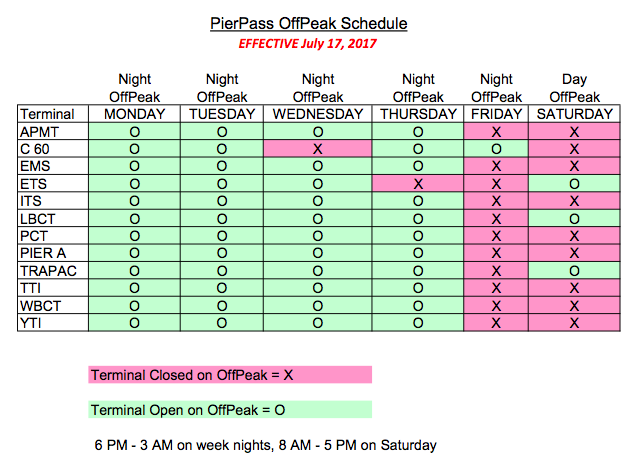LONG BEACH, Calif., April 16, 2018—PierPass will overhaul the model used by its OffPeak program for truck traffic mitigation at the Ports of Los Angeles and Long Beach, replacing the current congestion pricing model with an appointment-based system that uses a single flat fee on both daytime and nighttime container moves.
The members of the West Coast MTO Agreement (WCMTOA)—the 12 marine terminal operators at the two adjacent ports—reached the decision after an 18-month process of consultation with industry stakeholders, and an analysis and survey by industry consultants.
Port users have expressed a desire for changes to increase flexibility and reduce the bunching up of trucks that often occurs before the start of the nighttime OffPeak shifts. Subject to regulatory approval, the revised OffPeak program is expected to begin in August.
“The industry has been demanding ‘PierPass 2.0,’ and we are responding,” said PierPass President John Cushing. “The original OffPeak program was an innovative and highly effective solution to the challenges we faced in 2005. But it was fairly inflexible, whereas an appointment-based model is scalable and can evolve to meet changing industry needs, technology and practices.”
Under the current program, OffPeak charges a Traffic Mitigation Fee (TMF) on weekday daytime cargo moves to incentivize cargo owners to use OffPeak shifts on nights and Saturdays. The revised OffPeak program will replace this two-tier fee structure with a single flat TMF during both shifts, and use appointments to spread traffic across the two shifts.
Applying the TMF to both day and night cargo will allow a reduction of more than 55 percent in the TMF while still providing funding to operate extended gates. The current TMF of $72.09 per TEU (twenty-foot equivalent unit) will be replaced by a new flat fee of $31.52 per TEU; the rate for all other container sizes will be a flat fee of $63.04.
“The Port of Long Beach is pleased with the progress PierPass has made in working with industry stakeholders to improve night gate operations in our terminals,” said Port of Long Beach Executive Director Mario Cordero. “As ships are getting bigger and volumes increase, efficient gate management is critical to our ability to move cargo in a reliable, predictable and expedient manner.”
“I’m pleased and encouraged that PierPass members are taking a significant step forward to improve efficiencies at the San Pedro Bay port complex,” said Port of Los Angeles Executive Director Gene Seroka. “We, as well as the trucking community and all of our stakeholders, look forward to increased cargo velocity and customer responsiveness at Port facilities.”
The process of reviewing OffPeak alternatives has included a series of meetings beginning with an October 2016 workshop where WCMTOA met with more than 70 leaders representing importers, exporters, trucking companies, logistics providers, elected officials, government representatives, port authorities and other supply chain stakeholders. After a series of subsequent stakeholder meetings to delve into potential alternative models, PierPass retained industry consultants to conduct a detailed analysis. The consultants’ findings were presented and discussed at a follow-up industry workshop on March 8, 2018. WCMTOA members then worked through the remaining issues to arrive at the final plan for the revised OffPeak program.
“The California Trucking Association appreciates the proposal put forth by PierPass regarding its re-structuring of the TMF,” said Alex Cherin, Executive Director of the CTA Intermodal Conference. “This is the culmination of many collaborative discussions between the marine terminal operators and trucking communities over the last few years, and we look forward to supporting these efforts.”
“The HTA has worked hard with our marine terminal colleagues to create a more efficient and environmentally sustainable port complex,” said Weston LaBar, CEO of the Harbor Trucking Association. “This new direction for PierPass is another example of cross-industry collaboration and is a giant step in the right direction. It shows that the San Pedro Bay Port Complex will continue to be the preferred gateway for moving America’s cargo.”
A Q&A about the revised OffPeak program is available at www.pierpass.org/wp-content/uploads/2018/04/QA-on-New-OffPeak-Program_4-16-18.pdf. The West Coast MTO Agreement is a discussion agreement filed with the FMC. For more information and to track continuing developments, please go to www.pierpass.org.
###

